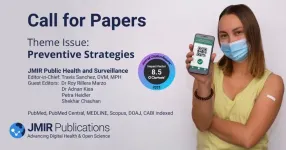(Press-News.org) Automated Insulin Delivery in Women with Pregnancy Complicated by Type 1 Diabetes
The New England Journal of Medicine: Hybrid Closed-Loop technology improved maternal glucose levels during pregnancy complicated by type 1 diabetes.
Authors say that hybrid closed-loop technology should now be offered to all pregnant women with type 1 diabetes
For pregnant women with type 1 diabetes, a technology giving insulin doses as informed by a smartphone algorithm, helps them better manage their blood sugars, compared to traditional insulin pumps or multiple daily injections, according to a new randomised trial published in The New England Journal of Medicine and presented at the European Association for the Study of Diabetes (EASD) meeting.
Despite better systems for monitoring blood sugars and delivering insulin, altered eating behaviours and hormonal changes during pregnancy, mean that most women struggle to reach the recommended blood sugar targets. This means that complications related to having type 1 diabetes during pregnancy are widespread, affecting one in every two newborn babies. For the baby, these include premature birth, need for intensive care after birth, and being too large at birth, which increases the lifelong risk of overweight and obesity. Low blood sugars, excess weight gain, and high blood pressure during pregnancy are common amongst mothers.
The authors of the study say that, as a result of these findings, this type of technology should now be offered to all pregnant women with type 1 diabetes to help improve maternal blood sugars.
In the study, researchers trialled a technology known as Hybrid Closed-Loop or Artificial Pancreas. The technology consists of an algorithm which sits on a smartphone and communicates with the traditional continuous glucose monitoring and insulin pump systems. The system adjusts insulin doses every 10-12 minutes according to blood sugar levels, meaning that it continuously responds to the persistent changes in blood sugar levels throughout pregnancy. They compared this technology with the traditional continuous glucose monitoring and insulin systems, where women supported by specialist diabetes maternity teams, make multiple daily decisions about insulin doses.
Eleanor Scott, Professor of Medicine (Diabetes and Maternal Health) in the University of Leeds' School of Medicine, said: "This is the good news that pregnant women with type 1 diabetes and NHS maternity services have been waiting for. It is great to see advances in diabetes technology come to fruition and deliver such improvements for pregnancy. Having recently successfully implemented continuous glucose monitoring uniformly across the NHS in England to improve mother and baby outcomes for pregnant women with Type 1 diabetes, we are now well positioned for a similar roll out of hybrid closed loop to improve the situation further
The study involved 124 pregnant women with type 1 diabetes aged 18-45 years who managed their condition with daily insulin therapy. Half were randomly allocated to use the Hybrid Closed-Loop technology, and half to use the traditional insulin therapy (insulin pumps or multiple daily injection methods). They took part for approximately 24 weeks (from 10-12 weeks) until the end of pregnancy. The study took place in 9 NHS hospitals in England, Scotland, and Northern Ireland.
On average, pregnant women used the Hybrid Closed-Loop technology for more 95% of the time. Using the technology helped to substantially reduce maternal blood sugars throughout pregnancy. Compared to traditional insulin therapy methods, women who used the technology spent more time in the target range for pregnancy blood sugar levels (68% vs 56% – equivalent to an additional 2.5-3.0 hours every day throughout pregnancy). It was safely initiated during the first trimester, which is a crucially important time for babies’ development. The blood sugar levels improved consistently in mothers across of all ages, and regardless of their previous blood sugar levels or previous insulin therapy. These improvements were achieved without additional low blood glucose events, and without additional insulin. Women using the technology also gained 3.5 kg (equal to 7.7 lbs) less weight and were less likely to have blood pressure complications during pregnancy.
Importantly, women using the technology also had fewer antenatal clinic appointments, and fewer out-of-hours calls with maternity clinic teams, suggesting that this technology could also be time saving for pregnant women and for stretched maternity services.
“For a long time, there has been limited progress in improving blood sugars for women with type 1 diabetes, so we’re really excited that our study offers a new option to help pregnant women manage their diabetes,” says lead author Professor Helen Murphy (University of East Anglia, Norwich, UK). “We know that for women with type 1 diabetes, unborn babies are exquisitely sensitive to small rises in blood sugars, so keeping blood sugar levels within the normal range during pregnancy is crucial to reduce risks for the mother and child. Previous studies have confirmed that every extra hour spent in the blood sugar target range reduces the risks of premature birth, being too large at birth and need for admission to neonatal intensive care unit. This technology is game changing, in that it will allow more women to have safer, healthier, more enjoyable pregnancies, with potential for lifelong benefits for their babies.” [1]
The researchers note some limitations, including that the current study was too small for a detailed examination of baby health outcomes, and that their results are specific to the CamAPS technology, so cannot be extrapolated to closed-loop systems, with higher blood sugar targets, that may not be applicable for use during pregnancy.
NOTES TO EDITORS
The study was funded by the Efficacy and Mechanism Evaluation (EME) Program, an MRC and NIHR partnership and supported by the Juvenile Diabetes Research Foundation (JDRF), and the Diabetes Research & Wellness Foundation (DRWF). The views expressed in this publication are those of the authors and not necessarily those of the Medical Research Council (MRC), National Institute for Health and Care Research (NIHR), or the Department of Health and Social Care. A full declaration of interests is included in the article. The study was conducted by researchers from the Norfolk and Norwich University Hospitals NHS Foundation Trust and University of East Anglia, Norwich, Cambridge University Hospitals NHS Foundation Trust, and the Wellcome-MRC Institute of Metabolic Science, University of Cambridge, Cambridge, the Leeds Institute of Cardiovascular and Metabolic Medicine, University of Leeds, Leeds, the Institute of Cardiovascular and Medical Sciences, University of Glasgow, Glasgow, King’s College Hospital NHS Foundation Trust, London, the Regional Centre for Endocrinology and Diabetes, Royal Victoria Hospital, Belfast, Barnard Health Research, Southampton, and the Usher Institute and the Centre for Cardiovascular Science, University of Edinburgh, Edinburgh — all in the UK; and the Jaeb Center for Health Research, Tampa, Florida, USA.
[1] Quote direct from author and cannot be found in the text of the Article.
For interviews with the Article authors Prof Helen Murphy, University of East Anglia, Norwich, UK please contact: Email: helen.murphy@uea.ac.uk or Tel: 0044 7595 166852
Prof Roman Hovorka, University of Cambridge, Cambridge, UK please contact Email: rh347@cam.ac.uk or Tel 7776 252445
Prof Eleanor Scott, University of Leeds, Leeds, UK please contact Email: E.M.Scott@leeds.ac.uk or Tel: 0044 7876 031952
END
Automated insulin delivery in women with pregnancy complicated by Type 1 diabetes
The New England Journal of Medicine: Hybrid closed-loop technology improved maternal glucose levels during pregnancy complicated by type 1 diabetes
2023-10-10
ELSE PRESS RELEASES FROM THIS DATE:
Brain & Behavior Research Foundation awards 2023 outstanding achievement prizes to five leading psychiatric researchers
2023-10-10
The Brain & Behavior Research Foundation, the world’s largest private funder of mental health research grants, today announced it is awarding the 2023 Outstanding Achievement Prizes in Mental Health to five scientists for their exceptional work in advancing psychiatric research. The prizewinners will be the featured speakers at the BBRF International Mental Health Research Symposium on October 27, 2023, in New York City, and will receive their awards later that evening at the BBRF International ...
Mount Sinai researchers first to develop age prediction model on human brain tissue using artificial intelligence
2023-10-10
Paper Title: Histopathologic Brain Age Estimation via Multiple Instance Learning
Journal: Acta Neuropathologica, October 10, 2023
Authors: John F. Crary, MD, PhD, Professor of Pathology, Molecular and Cell-Based Medicine, Neuroscience, and Artificial Intelligence and Human Health at the Icahn School of Medicine at Mount Sinai; Kurt W. Farrell, PhD, Assistant Professor of Pathology, Molecular and Cell-Based Medicine, Neuroscience, and Artificial Intelligence and Human Health at Icahn Mount Sinai; Gabriel A. Marx, MD, MS, Resident in Neurology at Icahn Mount Sinai; and other coauthors.
Bottom Line: The aging brain undergoes structural ...
JMIR Public Health and Surveillance call for papers theme issue on preventive strategies
2023-10-10
JMIR Public Health and Surveillance Editor-in-Chief: Travis Sanchez and guest editors Dr. Roy Rillera Marzo, Dr. Adnan Kisa, Petra Heidler and Shekhar Chauhan welcome submissions to a special theme issue examining "Scaling Up Effective Public Health Interventions for Long-Term Population Health Benefits."
This special issue aligns with the journal’s commitment to advancing knowledge in public health and disease prevention. It provides an opportunity to showcase cutting-edge research in preventive strategies, with ...
John D. Carpten, Ph.D., City of Hope’s chief scientific officer, elected to prestigious National Academy of Medicine
2023-10-10
LOS ANGELES — John D. Carpten, Ph.D., chief scientific officer at City of Hope, one of the largest cancer research and treatment organizations in the United States and a leading research center for diabetes and other life-threatening illnesses, was presented with one of the highest honors in health and medicine today when he was elected to the National Academy of Medicine (NAM).
NAM recognized Carpten “for leading the genomics field in understanding how racial and ethnic backgrounds affect cancer predisposition,” sharing that ...
Can immunity from routine vaccines be used to fight cancer?
2023-10-10
A University of Massachusetts Amherst team has demonstrated in theory that a protein antigen from a childhood vaccine can be delivered into the cells of a malignant tumor to refocus the body’s immune system against the cancer, effectively halting it and preventing its recurrence.
The bacteria-based intracellular delivering (ID) system uses a non-toxic form of Salmonella that releases a drug, in this case a vaccine antigen, after it’s inside a solid-tumor cancer cell.
“As an off-the-shelf immunotherapy, this bacterial system has ...
X-rays reveal microstructural fingerprints of 3D-printed alloy
2023-10-10
ITHACA, N.Y. -- Cornell researchers took a novel approach to explore the way microstructure emerges in a 3D-printed metal alloy: They bombarded it with X-rays while the material was being printed.
By seeing how the process of thermomechanical deformation creates localized microscale phenomena such as bending, fragmentation and oscillation in real time, the researchers will be able to produce customized materials that incorporate such performance-enhancing characteristics.
The group’s paper, “Dendritic Deformation Modes in Additive ...
New study offers improved strategy for social media communications during wildfires
2023-10-10
In the last 20 years, disasters have claimed more than a million lives and caused nearly $3 trillion in economic losses worldwide, according to the United Nations.
Disaster relief organizations (DROs) mobilize critical resources to help impacted communities, and they use social media to distribute information rapidly and broadly. Many DROs post content via multiple accounts within a single platform to represent both national and local levels.
Specifically examining wildfires in collaboration with the Canadian Red Cross (CRC), new research from the University of Notre Dame contradicts ...
Powering AI could use as much electricity as a small country
2023-10-10
Artificial intelligence (AI) comes with promises of helping coders code faster, drivers drive safer, and making daily tasks less time-consuming. But in a commentary published October 10 in the journal Joule, the founder of Digiconomist demonstrates that the tool, when adopted widely, could have a large energy footprint, which in the future may exceed the power demands of some countries.
“Looking at the growing demand for AI service, it’s very likely that energy consumption related to AI will significantly increase in the coming years,” says author Alex de Vries (@DigiEconomist), a Ph.D. candidate at Vrije Universiteit Amsterdam.
Since 2022, generative AI, which ...
Sweet Victory: Sensor detects adulteration in honey
2023-10-10
Adulteration is a bitter truth in the sweet world of honey. As consumers seek nature’s nectar for its purity and health benefits, a shadowy industry taints this golden elixir with hidden additives, most commonly water.
Standard detection methods of honey adulteration are expensive, and either have complicated operation methods or low detection accuracy.
In Review of Scientific Instruments, from AIP Publishing, a team of scientists from the Nanjing University of Aeronautics and Astronautics ...
Improving follow-up of abnormal cancer screening results
2023-10-10
About The Study: A multilevel primary care intervention that included electronic health record reminders and patient outreach with or without patient navigation improved timely follow-up of overdue abnormal cancer screening test results for breast, cervical, colorectal, and lung cancer.
Authors: Steven J. Atlas, M.D., M.P.H., of Massachusetts General Hospital in Boston, is the corresponding author.
To access the embargoed study: Visit our For The Media website at this link https://media.jamanetwork.com/
(doi:10.1001/jama.2023.18755)
Editor’s Note: Please see the article for additional information, including ...
LAST 30 PRESS RELEASES:
One strategy to block both drug-resistant bacteria and influenza: new broad-spectrum infection prevention approach validated
Survey: 3 in 4 skip physical therapy homework, stunting progress
College students who spend hours on social media are more likely to be lonely – national US study
Evidence behind intermittent fasting for weight loss fails to match hype
How AI tools like DeepSeek are transforming emotional and mental health care of Chinese youth
Study finds link between sugary drinks and anxiety in young people
Scientists show how to predict world’s deadly scorpion hotspots
ASU researchers to lead AAAS panel on water insecurity in the United States
ASU professor Anne Stone to present at AAAS Conference in Phoenix on ancient origins of modern disease
Proposals for exploring viruses and skin as the next experimental quantum frontiers share US$30,000 science award
ASU researchers showcase scalable tech solutions for older adults living alone with cognitive decline at AAAS 2026
Scientists identify smooth regional trends in fruit fly survival strategies
Antipathy toward snakes? Your parents likely talked you into that at an early age
Sylvester Cancer Tip Sheet for Feb. 2026
Online exposure to medical misinformation concentrated among older adults
Telehealth improves access to genetic services for adult survivors of childhood cancers
Outdated mortality benchmarks risk missing early signs of famine and delay recognizing mass starvation
Newly discovered bacterium converts carbon dioxide into chemicals using electricity
Flipping and reversing mini-proteins could improve disease treatment
Scientists reveal major hidden source of atmospheric nitrogen pollution in fragile lake basin
Biochar emerges as a powerful tool for soil carbon neutrality and climate mitigation
Tiny cell messengers show big promise for safer protein and gene delivery
AMS releases statement regarding the decision to rescind EPA’s 2009 Endangerment Finding
Parents’ alcohol and drug use influences their children’s consumption, research shows
Modular assembly of chiral nitrogen-bridged rings achieved by palladium-catalyzed diastereoselective and enantioselective cascade cyclization reactions
Promoting civic engagement
AMS Science Preview: Hurricane slowdown, school snow days
Deforestation in the Amazon raises the surface temperature by 3 °C during the dry season
Model more accurately maps the impact of frost on corn crops
How did humans develop sharp vision? Lab-grown retinas show likely answer
[Press-News.org] Automated insulin delivery in women with pregnancy complicated by Type 1 diabetesThe New England Journal of Medicine: Hybrid closed-loop technology improved maternal glucose levels during pregnancy complicated by type 1 diabetes



